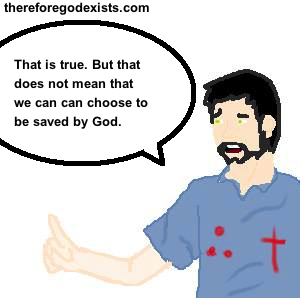 If I carefully examine the evidence and data of a certain proposition, I will reach a conclusion regarding the truth value of that proposition. On the basis of that my conclusion, I will take an action. If I had reached an alternative conclusion, I would have taken a different course of action. Humans routinely examine data and react to evidence in a way that they otherwise would not have. For this reason, we seem to have developed this notion of freedom of the will. I can choose to do anything that I want to do in the natural world. The fundamental distinction between man and animals is, in fact, our ability to make choices that are based upon more than just instinct. If our instinct is telling us to do something, we begin to analyze that thing. We ask, not only, “do I want this?” (the instinctual question), but also questions of practicality and morality. We exceed and overpower our instinct in many situations. The question is, does this freedom of the will extend to the religious quarters? Do we have the free will to choose salvation?
If I carefully examine the evidence and data of a certain proposition, I will reach a conclusion regarding the truth value of that proposition. On the basis of that my conclusion, I will take an action. If I had reached an alternative conclusion, I would have taken a different course of action. Humans routinely examine data and react to evidence in a way that they otherwise would not have. For this reason, we seem to have developed this notion of freedom of the will. I can choose to do anything that I want to do in the natural world. The fundamental distinction between man and animals is, in fact, our ability to make choices that are based upon more than just instinct. If our instinct is telling us to do something, we begin to analyze that thing. We ask, not only, “do I want this?” (the instinctual question), but also questions of practicality and morality. We exceed and overpower our instinct in many situations. The question is, does this freedom of the will extend to the religious quarters? Do we have the free will to choose salvation?
 We might be keen to think that of course we can. If we have free will in every other area of life, then why not also the free will for us to choose our salvation? But I would like to suggest that we do not have the free will to choose our salvation. Our salvation must be decreed and offered to us by God himself. Only God can bring about our salvation, and there is nothing that we may contribute to it. This is the long-standing dispute between monergism and synergism. Monergism is the view that God alone is responsible for our salvation. Synergism is the view that God and man are working in synergy to bring about salvation. God makes it possible, and man, by his freedom of the will, accepts it. Do we have the free will to choose salvation? I would like to suggest that this view is both biblically and logically untenable.
We might be keen to think that of course we can. If we have free will in every other area of life, then why not also the free will for us to choose our salvation? But I would like to suggest that we do not have the free will to choose our salvation. Our salvation must be decreed and offered to us by God himself. Only God can bring about our salvation, and there is nothing that we may contribute to it. This is the long-standing dispute between monergism and synergism. Monergism is the view that God alone is responsible for our salvation. Synergism is the view that God and man are working in synergy to bring about salvation. God makes it possible, and man, by his freedom of the will, accepts it. Do we have the free will to choose salvation? I would like to suggest that this view is both biblically and logically untenable.
We are enemies of God. If you find the absence of freedom of the will in matters of salvation to be a repellant, then I would call you to maintain it. You are welcome to the view that anybody can freely choose God. However, this comes with the caveat that, while you have that option available to you, you would never choose it. Freedom of the will involves choosing what you want, what is prudent, and what is intelligent. But the autonomous individual will always find reasons to choose unrighteousness. They will never choose God because they hate him. Man always wants to do anything that he wants. The unregenerate sees God as oppressive, locking him into a legalistic cage.
Hence, the Bible says of mans’ natural state that “There is nobody righteous, no, not one. There are none who understand. There are none who seek after God.” (Romans 3:10-11). Again, Genesis 6:5 tells us that man is “only evil continually.” Jeremiah 17:19 reminds us that “the heart of man is deceitful and wicked above all things.” Jesus tells us that what comes from within a persons’ very own heart is what defiles them (Mark 7:20). This serves to establish what is known as total depravity. Man is completely unable and unwilling to turn to God in faith and repentance. We just never would on our own. Do we have the free will to choose salvation? It does not really matter, does it? Even if we do, we never would.
In response to this, many people will appeal to a doctrine known as prevenient grace. Prevenient grace is the view that while man is totally depraved, unable to come to God, God offers a little bit of grace to everyone, thus activating the faith center of their heart and allowing them to turn to God. But there are a few problems with this. First of all, if God were to offer prevenient grace to everybody, then why is it that everybody does not turn to him in faith? Is it that one person is more righteous than another? Is one person more wise than another? Obviously not, because salvation is not a matter of how righteous we are, lest we be guilty of salvation by works. We are left to think, then, that God grants more prevenient grace to one person than he does to another. But this leaves us with monergism, rather than synergism. Secondly, if God grants prevenient grace, and they respond to it, then they would essentially be working alongside God to bring about their salvation. But Romans 11:6 tells us that if there are any works in grace, then it is no longer grace. Would prevenient grace even be grace, given the testimony of the apostle?
We are either slaves of sin or slaves of righteousness. If I am a slave of somebody, then I cannot choose to be free. That is fundamental to slavery. If I sell myself into slavery, then I enter into a contract wherein I cannot choose to be free until the end of that contract. The person who is a slave has an autonomy with a very limited scope. They might be able to freely choose some things, but only things within the confines of their slavery. They cannot choose their freedom. Likewise, the person who has not been born again is a slave of their sinful nature. The younger man might be a slave to partying, drinking, smoking, and lust. The older man might be a slave to money, wealth, power, and comfort. Either way, they are entrapped by that system, and in many ways, have developed a love for their chains.
This is the model of our relationship with sin that the Bible describes. Jesus tells us, “the person who commits sin is a slave to sin.” (John 8:34). Paul likewise describes the unregenerate as slaves to sin (Romans 6:20). In his masterpiece, Pilgrim’s Progress, John Bunyan illustrated this reality. Faithful told his companion Christian that a man was trying to lure him into a city called Deceit. The man spoke eloquently of the many delights within that city. But, Faithful recounted his wisdom, saying, “…and however he flattered, when he got me home to his house he would sell me for a slave.” The person who commits sin is a slave of sin. How is it that a slave of sin can do righteousness? Do we have the free will to choose salvation? I think not. The unregenerate is a slave of sin.
Now this might bring us back to the issue of prevenient grace. But it is quite curious that the Bible can even use language, such as “slave of sin,” if it is the case that we have this prevenient grace that has enabled us to choose God. While that might be our natural state of affairs, it is just not a prudent description, because it is not what we actually stand as today. Today, we allegedly stand as people activated by prevenient grace. So when we are called slaves of sin, or unwilling to choose God, that does not really describe what we actually are. In this way, it seems to me that prevenient grace strikes closely to abandoning the doctrine of original sin. How is it that we can even speak of original sin as a relevant theme? How is it relevant? How is our depravity relevant?
Does God fail? If we have the freedom of the will to choose our salvation, that means that God is actively laboring to save each and every one of us. The person who drew their last breath, cursing God, in hatred of him, was, in fact, the recipient of God’s effort. God desperately tried to save that person, but alas, their free will overpowered him. This happens on a drastic scale. God tries to save everybody, and the majority of humanity turns their back on him. The majority of humanity enjoys the pleasure of sin more than they enjoy the pleasure of God. If we look at this as a battle between God and Satan, then Satan is luring all of these people into his presence, while God is able to lure just a few to him. But most of the world prefers Satan. Both God and Satan are vying for the souls of the masses, and in the grand scheme of things, Satan comes out with many more souls in his grasp than God does.
Yet this seems unthinkable when we reflect on the grand claims of God’s power and sovereignty in the Bible. Nebuchadnezzar said of God in Daniel 4:35, “All the inhabitants of the earth are accounted as nothing, But He does according to His will in the host of heaven, and among the inhabitants of earth, and no one can ward off His hand or say to Him, ‘What have You done?’” The very same God who alters the will of men, so that what they intend for evil, he intends for good (Genesis 50:20). Do we have the free will to choose salvation? It is unthinkable that God would collapse before the free will of man. He can surely overpower our will, and draw us to himself. He is more powerful than Satan, more powerful than the nations, and more powerful than the individual. Thus, when Jesus calls, his sheep hear his voice (John 10:27).
If you would like to get in on the discussion about this, join my Theology Discussion Group!

